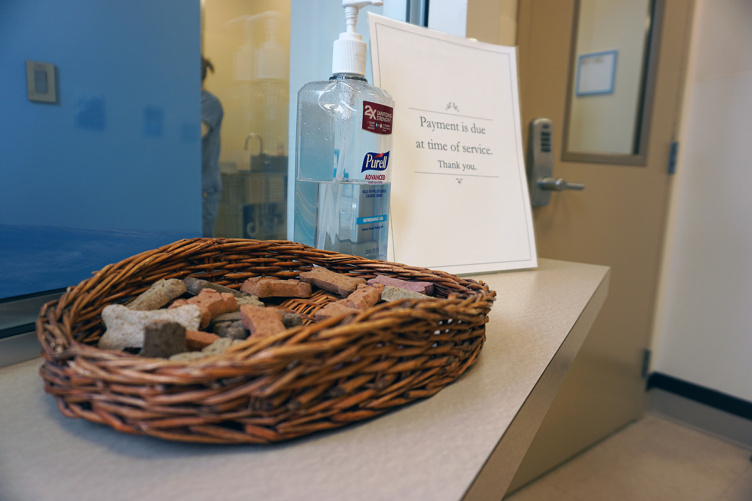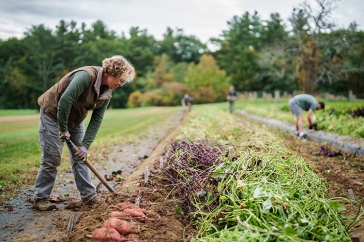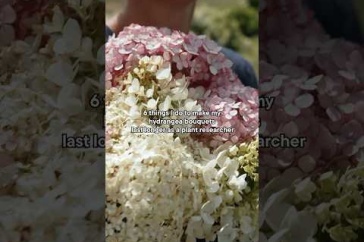
Reception area at the UNH PAWS Veterinary Clinic
Sandra Demers grew up with farm animals and cats, but she wasn’t sure she could afford a pet for her children until she learned about UNH’s PAWS Veterinary Clinic. Opened in 2017, the on-campus veterinary clinic provides people who receive government assistance with affordable pet wellness exams, vaccines and testing, medications, dental care and basic surgeries like spays and neuters.

Thanks to the clinic, Demers has the peace of mind that her two new kittens are healthy, and she’s able to afford the vaccinations and sterilization surgery that’s required by the housing community where she lives.
“The staff is very good about giving out information —what they’re doing and why they’re doing it — and they always call to follow-up and see how the cats are doing,” said Demers. “They not only look after the best interests of the cats, but also the best interests of the pet owners.”
Along with serving an important role for lower income pet owners, the PAWS Clinic is a teaching facility for students in the Thompson School of Applied Science’s veterinary technology program. According to Dr. Sarah Proctor, the veterinary technology program director and clinic manager, it’s essential for preparing students to interact with clients.
“I hear from employers across the board, the number one thing they want is a tech who can graduate with the ability to talk to the clients,” said Proctor. “If we want our students to be able to act professionally and earn a pet owner’s trust, we have to give them an opportunity to practice. It’s very different to learn something in a classroom than to work in a clinical setting with an animal and the owner who’s watching you. It’s one thing to say, ‘you do it this way,’ it’s a very different thing to go do it.”
The experience appears to be having the impact Proctor hopes. CC Dickinson, whose dog Teddy has been treated for an anxiety disorder and skin allergy at the clinic, says the students will be a warm welcome to any office that employs them.
“I leave the clinic with a huge smile knowing my dog Teddy got the best care possible,” said Dickinson. “The entire staff treats me with such respect, concern, and always shares their kind hearts with Teddy. I feel truly blessed to have discovered this place.”
In the clinic’s first year of operation, the staff has seen 94 patients and provided services and products with a commercial value of roughly $60,000 at a cost of only $3,000 to their clients.
"I leave the clinic with a huge smile knowing my dog Teddy got the best care possible. I feel truly blessed to have discovered this place."
Clients come primarily from the Somersworth and Dover housing communities, but according to the clinic’s assistant manager Vicki Soletsky, licensed veterinary technician/ certified veterinary technician, they’d like to reach more Granite Staters who qualify for low-cost pet care and therefore make it possible for more people to experience the joys of pet ownership.
“The cost of routine veterinary care has increased dramatically over the past decade,” said Soletsky. “In my opinion, this is detrimental to pet health, especially to those in low-income households. Our goal at the UNH PAWS Clinic is to bring veterinary wellness services to families who have to make difficult choices about household expenses every day.”
Supporting increased opportunities for pet ownership does more than provide homes for animals. According to the Centers for Disease Control and Prevention, studies show that pets can increase fitness, lower stress, and decrease blood pressure, cholesterol levels, triglyceride levels and feelings of loneliness for their owners. Research also suggests that children’s exposure to companion animals can ease anxiety.
At her last visit to the clinic, Demers and her 2-year-old daughter LeeAnna arrived with Daisy, one of the family’s two new kittens. Daisy would be coming back in two weeks to be spayed, but for now, Soletsky, who is also part of the veterinary technology program faculty, and a small team of students were checking the kitten to make sure she was healthy and thriving.
After the check-up, Demers asked her daughter if she wanted to hold Daisy, and the toddler eagerly scooped up the kitten and gathered her to her chest like a doll.
“Can you say thanks?” Demers asked her as they turn to leave.
“Fanks,” LeeAnna called with a smile as she headed down the ramp to the door.
-
Written By:
Sarah Schaier | College of Life Sciences and Agriculture
















































